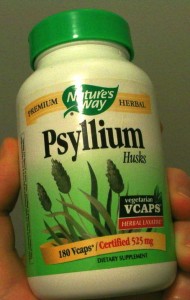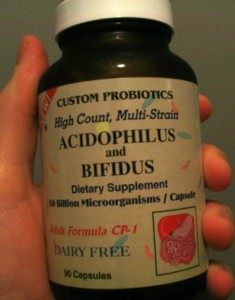Coronado Biosciences is developing a helminthic therapy treatment for Inflammatory Bowel Diseases such as Crohn’s Disease & Ulcerative Colitis that may open the therapy up to mainstream medicine.
Helminthic therapy is the treatment of autoimmune diseases or disorders via parasitic organisms, usually worms of some sort. Why helminthic therapy works rests on the hygiene hypothesis, which suggests that modern hygiene habits at an early age may be reducing the ability for our immune system to develop initially & later regulate itself. The idea is that without early exposure to certain pathogens, the immune system becomes reliant on allergic and/or inflammatory responses to common pathogens or irritants. Continue reading “Coronado Biosciences Developing Helminthic Therapy For Crohn’s Disease” »
A study released at the 15th International Congress of Mucosal Immunology in Paris, France suggests that diet can have an impact on the digestive ecosystem in those with Crohn’s Disease.
A pilot study, lead by UC Davis(San Francisco, CA), took a look at how various diets affect bacterial flora counts in those with Crohn’s Disease. Researchers examined the bacterial make-up of 6 patients with Crohn’s Disease who were in remission who had either been on a Low Residue Diet or the Specific Carbohydrate Diet. Their bacterial levels were compared to each other & a control group made up of people with healthy digestive systems. Previous studies have suggested that bacterial flora counts might play a part in Crohn’s Disease as those with Crohn’s Disease often show a lower bacterial flora count than those with a healthy digestive system. Continue reading “Diet Replenishes Bacterial Flora In Those With Crohn’s Disease” »
BioLineRx announced that it has licensed an experimental immunotherapy drug from Yissum Research Development Company Ltd which is the business side of Hebrew University of Jerusalem(Israel).
The drug is currently known as “BL-7040” & BioLineRx has plans to further develop & commercialize the drug worldwide. BL-7040 is an experimental drug that is still in testing, but it has already passed Phase Ib & Phase IIa clinical trials. Officially it won’t be known how well BL-7040 works until it’s subjected to Phase IIb clinical trials. However, Prof. Hermona Soreq sounds optimistic on the drug’s efficacy:
The efficacy of BL-7040 in these [earlier] studies was shown to be highly significant and comparable to that of dexamethasone, a steroid used routinely for IBD that has multiple side effects. Continue reading “BioLineRX’s TLR-9 Immunotherapy For Inflammatory Bowel Disease” »
A study by Liaoning University of Chinese Medicine suggests that acupuncture may have a positive effect for those with diarrhea predominate Irritable Bowel Syndrome.
The study took 30 male rats & put them through various stressors such as drinking water deprivation, electric shock & uncomfortable temperature variations. The rats were then divided into two groups, with 20 rats acting as the baseline model for the study while the other 10 were selected to receive acupuncture. The acupuncture was administered to the following acupuncture “channels”: “Xiajiao” (Lower Abdomen), “Dachang” (Large Intestine), “Gan” (Liver) and “Pi” (Spleen). Acupuncture treatments were given twice daily for seven days.
The results showed that the rats who did not receive acupuncture saw a downgraded level of serotonin transporters. Meanwhile, rats who did receive acupuncture saw markedly higher levels of serotonin transporters versus the model group. Continue reading “Acupuncture May Help Regulate Serotonin Levels In Those With IBS” »
Today we’re taking a look at Nature’s Way Psyllium Husks capsules.
 Psyllium husks come from the seeds of the psyllium plant. Psyllium husks are hydrophilic meaning they are attracted to water & readily absorb it. When saturated with water psyllium husks produce mucilage which is a thick gooey substance. Mucilage creates a film over mucous membranes, such as those found in the intestines. This film can help with the passage of stool as well as lowering inflammation by reducing the chances of irritation.
Psyllium husks come from the seeds of the psyllium plant. Psyllium husks are hydrophilic meaning they are attracted to water & readily absorb it. When saturated with water psyllium husks produce mucilage which is a thick gooey substance. Mucilage creates a film over mucous membranes, such as those found in the intestines. This film can help with the passage of stool as well as lowering inflammation by reducing the chances of irritation.
Psyllium husk is not digestible so it can be thought of as a “bulking agent”, meaning it will help add size to stool potentially increasing the chances of properly formed stool, which can aid with proper bowel movements.Psyllium husk is often advertised as a laxative, but it’s not a stimulant & can be used on a daily basis for those who want to try adding fiber to their their daily diet or treatment regimen. Fiber supplementation can be helpful for things like chronic diarrhea or constipation related to Irritable Bowel Syndrome or Inflammatory Bowel Diseases like Crohn’s Disease or Ulcerative Colitis. Continue reading “Review: Nature’s Way Psyllium Husks” »
A study done back in May & released at the Digestive Disease Week conference suggests that gastroenteritis caused by viral or bacterial infection may play a key role in triggering Irritable Bowel Syndrome.
Continue reading “Study Suggests Infection Key To IBS, Especially In Military” »
Inflammatory Bowel Diseases can affect not just your family members, but also your family pet.
 Mississippi State University is reporting that, “TaTonka Gold”, their living dog mascot had to be euthanized due to a number of health problems, one of which was Inflammatory Bowel Disease. This reminded me of an article I saw a few weeks back: “Treating inflammatory bowel disease in dogs” from the Washington Post’s website. That article involved a pet owner writing in about their dog’s digestive problems, the answer they received back was too look into the possibility that their dog has IBD. Continue reading “Inflammatory Bowel Disease Can Affect Cats & Dogs” »
Mississippi State University is reporting that, “TaTonka Gold”, their living dog mascot had to be euthanized due to a number of health problems, one of which was Inflammatory Bowel Disease. This reminded me of an article I saw a few weeks back: “Treating inflammatory bowel disease in dogs” from the Washington Post’s website. That article involved a pet owner writing in about their dog’s digestive problems, the answer they received back was too look into the possibility that their dog has IBD. Continue reading “Inflammatory Bowel Disease Can Affect Cats & Dogs” »
Today we’re reviewing Custom Probiotics CP-1 Adult Formula, a multi-strain probiotic containing 50 billion colony forming units.
 When I first started looking into getting on a serious probiotic regimen I believed the holy grail of probiotics would be a low CFU(colony forming units) probiotic that you could slowly taper up as you got used to it. CFU is a measurement of the number of colony forming bacteria units inside a probiotic supplement. Supposedly the idea is that the more CFU the higher chances the bacteria will populate the digestive system.
When I first started looking into getting on a serious probiotic regimen I believed the holy grail of probiotics would be a low CFU(colony forming units) probiotic that you could slowly taper up as you got used to it. CFU is a measurement of the number of colony forming bacteria units inside a probiotic supplement. Supposedly the idea is that the more CFU the higher chances the bacteria will populate the digestive system.
My target at the time was around 1 billion CFU. This is why I reviewed a lot of products like Primadophilus for Children & Align. Part of the reason I was concerned with finding a low CFU probiotic was due to the fact that I often experienced herx reactions(flu like symptoms) & constipation when taking probiotics. My thought was that if I go low & slow, my body will adjust as I taper up. I’ve since learned that any probiotic I take gives me these reactions, so for me, low & slow has failed. I was often not taking probiotics because of the symptoms they produced.
Another thing to keep in mind is that the digestive system has literally zillions of bacteria within it. For someone with a serious bacterial imbalance, a 1 billion CFU probiotic product may cause a negative reaction like herx, but not offer any benefit as the bacteria die off before they can do anything worthwhile. Continue reading “Review: Custom Probiotics CP-1 50 Billion CFU Adult Formula” »
Researchers at Utah State University are working hard to map the digestive tract’s ecosystem.
Utah State University is moving forward with further research into the different types of bacteria that live in our digestive system & how the foods we eat impact them. The study, called “Gut Check”, will be inviting residents of Cache County in Utah to participate. Participants help by answering a health survey, getting basic blood tests, keeping a detailed food diary(including pictures) for 4 days & then finally submitting a stool sample. In return they get free lab work & $20 buckaroos. The bacteria within the stool sample will be genetically analyzed to find out what type it is. Once all the stool samples are analyzed the data will then be reviewed looking for relationships between food eaten & the bacteria present. Continue reading “Utah State University’s Enterotype Research With “Gut Check”” »
Comedian Julian McCullough finds out when your appendix fails it’s not funny business, sorta…
A segment of this weeks This American Life had a rather funny story where comedian Julian McCullough discusses the ordeal he had when his appendix burst, sending him to the emergency room.
The appendix is the only organ in our body that doesn’t have a job to do, but it’s the first one to be like “screw this” {poof}.
Listen to the story on This American Life’s website.
It is important to say that research is showing that the appendix is most likely a hang out spot for beneficial bacteria when there is a problem in the intestinal tract. Basically a safe house while the body tries to flush out invaders. Once the problem is resolved the healthy bacteria can repopulate the intestinal tract. So, the appendix is not entirely useless ;).

 When I first started looking into getting on a serious probiotic regimen I believed the holy grail of probiotics would be a low CFU(colony forming units) probiotic that you could slowly taper up as you got used to it. CFU is a measurement of the number of colony forming bacteria units inside a probiotic supplement. Supposedly the idea is that the more CFU the higher chances the bacteria will populate the digestive system.
When I first started looking into getting on a serious probiotic regimen I believed the holy grail of probiotics would be a low CFU(colony forming units) probiotic that you could slowly taper up as you got used to it. CFU is a measurement of the number of colony forming bacteria units inside a probiotic supplement. Supposedly the idea is that the more CFU the higher chances the bacteria will populate the digestive system.